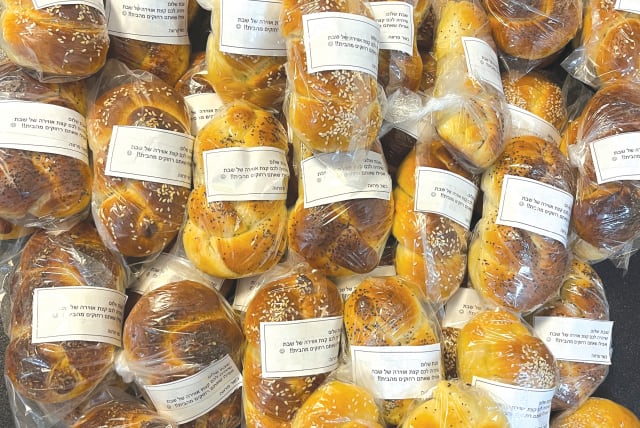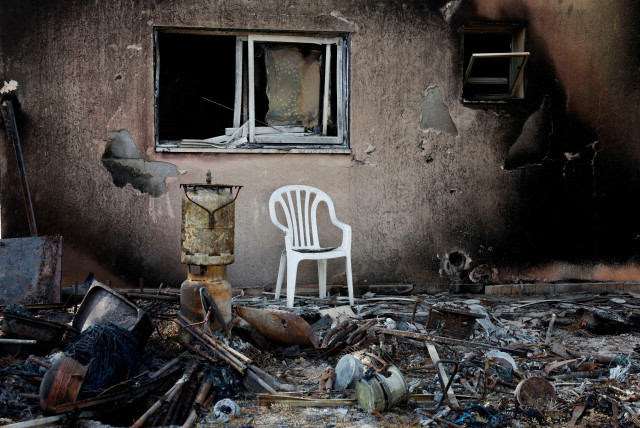As the challah dough rises our unity grows

As the challah dough rises, it becomes a sign to each and every one of us of the growth of that unity.
Since the tragic events of October 7, I have found myself baking several kilos of challah every week for soldiers. Initially, I didn’t read too much into it as I always loved making challah. However, as the war went on, I began to realize the profound significance of challah during these times.
Week after week, people from all different walks of life have started baking challah for soldiers, evacuated families and Shabbat meals with their friends and family – and I am one of them. A few weeks ago I had the opportunity of baking challah with a diverse group of individuals from various parts of the world, differing religious backgrounds, and many with minor kitchen skills. What surprised me was the common thread among us: Nearly every person mentioned that since October 7, they had started making challah.
I spoke to women who had never attempted this challenge before who now make it every week; men who initially perceived it as a women’s mitzvah, who discovered a new passion in bread-making; and individuals who previously found the kitchen intimidating but bravely took on the challenge of creating this significant Jewish bread. Week by week, I see people sharing their challah diaries on social media or volunteering groups all doing good together.
Some see this as a chance to recite an additional blessing and fulfill the mitzvah of hafrashat challah (separating a symbolic amount of dough to be burnt) and pray for the safety of loved ones. Others view it as an opportunity to offer something tasty to those in need. For many, it’s also a source of therapeutic enjoyment during these times. For all of us, it’s a strong symbol of Judaism.
Significance of challah
This past week, while watching my eight kilos of dough rise, I took a moment to think about the significance of challah. How can it be that so many people have become so connected to making bread? It’s time-consuming and not the easiest of tasks.

But then I thought about the ingredients: water, oil, flour, sugar, yeast, and salt. It struck me that these ingredients can be found in almost every household, irrespective of background. The appeal of challah transcends cultural and religious boundaries, tempting even those less affiliated with Judaism who simply cannot say no to extra carbs.
The flour, reminiscent of sand, reminds us of the enduring spirit of Am Yisrael hai (the nation of Israel lives). Yeast and how it causes the dough to grow like a miracle from God symbolizes resilience. Salt illustrates how a small ingredient can make a massive difference and signifies the distinction between good and bad. Sugar adds sweetness, providing extra positivity during dark times. The oil, representative of the miracle of Hanukkah, reminds us of light even in the darkest hours. Lastly, water binds us all together, fostering unity – a central message conveyed by challah.
Additionally, thinking about challah and its ingredients is also a reminder of how every challah tastes different. You can use the exact same recipe as someone else, and yet it will not taste exactly the same. This is a reminder of our differences and how we should respect them and utilize them to grow.
In the midst of this challenging period, it’s easy to be consumed by narratives of sinat hinam (baseless hatred) and the struggle to find unity. It’s so easy to let the news consume and divide us. However, even in our darkest days, we find small signs that unify us and reinforce the vitality of our nation.
Challah, a bread loved by many with its humble ingredients and rich symbolism, is a frequent donation to our soldiers and those in need, a symbol on every Shabbat table, and a reminder that unity can prevail and allow our nation to thrive, even during these tough times.
As the challah dough rises, it becomes a sign to each and every one of us of the growth of that unity.
The writer is originally from Manchester, England, and a recent graduate of the Argov Fellows Program at Reichman University. She also has an Instagram page dedicated to Holocaust remembrance and education @mymissiontoremember.
